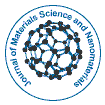எங்கள் குழு ஒவ்வொரு ஆண்டும் அமெரிக்கா, ஐரோப்பா மற்றும் ஆசியா முழுவதும் 1000 அறிவியல் சங்கங்களின் ஆதரவுடன் 3000+ உலகளாவிய மாநாட்டுத் தொடர் நிகழ்வுகளை ஏற்பாடு செய்து 700+ திறந்த அணுகல் இதழ்களை வெளியிடுகிறது, இதில் 50000 க்கும் மேற்பட்ட தலைசிறந்த ஆளுமைகள், புகழ்பெற்ற விஞ்ஞானிகள் ஆசிரியர் குழு உறுப்பினர்களாக உள்ளனர்.
அதிக வாசகர்கள் மற்றும் மேற்கோள்களைப் பெறும் திறந்த அணுகல் இதழ்கள்
700 இதழ்கள் மற்றும் 15,000,000 வாசகர்கள் ஒவ்வொரு பத்திரிகையும் 25,000+ வாசகர்களைப் பெறுகிறது
பயனுள்ள இணைப்புகள்
அணுகல் இதழ்களைத் திறக்கவும்
இந்தப் பக்கத்தைப் பகிரவும்
சுருக்கம்
Expert Opinions on Regulatory Readiness for Managing Nanotechnology Risks
Chris Beadriez
The ability of regulatory systems to evaluate and manage the advantages and dangers of new technologies is a key factor in determining their potential and promise. However, there is still a great deal of ambiguity around the potential effects of nanomaterials on human health and the environment, therefore the ability of current legislation to address this issue has been called into question. Here, we use data from a survey (N=254) of US-based regulatory scientists and decision-makers, environmental health and safety scientists, and nanoscientists and engineers to investigate whether regulatory bodies are prepared to manage the dangers associated with nanomaterials [1]. We find that the regulatory authorities are seen as being unprepared by all three expert groups. confidence in the capabilities of regulatory bodies to monitor their expanding use and use in society. The impact on scientists working on basic, applied, or health and safety research on nanomaterials is less noticeable than it is on regulators themselves. Particularly likely to perceive agencies as unprepared are those who consider the threats associated with nanotechnology to be novel, unknown,and difficult to quantify. Additionally identified as minor but important influences on perceived agency preparation were socio-political values, stakeholder responsibility for risk management, and trust in regulatory bodies [2]. These findings highlight the need for new techniques and tools to enable the assessment of nanomaterial dangers and to restore public trust in the ability of regulatory bodies to monitor their expanding use and use in society.
பாடத்தின் அடிப்படையில் இதழ்கள்
- இயற்பியல்
- இரசாயன பொறியியல்
- உணவு மற்றும் ஊட்டச்சத்து
- உயிர் மருத்துவ அறிவியல்
- உயிர்வேதியியல்
- கணிதம்
- கணினி அறிவியல்
- கால்நடை அறிவியல்
- சமூக & அரசியல் அறிவியல்
- சுற்றுச்சூழல் அறிவியல்
- தகவலியல்
- தாவர அறிவியல்
- நர்சிங் & ஹெல்த் கேர்
- நானோ தொழில்நுட்பம்
- நோயெதிர்ப்பு மற்றும் நுண்ணுயிரியல்
- புவியியல் மற்றும் பூமி அறிவியல்
- பொது அறிவியல்
- பொருள் அறிவியல்
- பொறியியல்
- மரபியல் & மூலக்கூறு உயிரியல்
- மருத்துவ அறிவியல்
- மருத்துவ அறிவியல்
- மருந்து அறிவியல்
- வணிக மேலாண்மை
- விவசாயம் மற்றும் மீன் வளர்ப்பு
- வேதியியல்
மருத்துவ & மருத்துவ இதழ்கள்
- அறுவை சிகிச்சை
- இதயவியல்
- இனப்பெருக்க மருத்துவம்
- இம்யூனாலஜி
- இரத்தவியல்
- உடல் சிகிச்சை மற்றும் மறுவாழ்வு
- எலும்பியல்
- கண் மருத்துவம்
- கண் மருத்துவம்
- காஸ்ட்ரோஎன்டாலஜி
- குழந்தை மருத்துவம்
- சிறுநீரகவியல்
- சுகாதாரம்
- தொற்று நோய்கள்
- தோல் மருத்துவம்
- நச்சுயியல்
- நரம்பியல்
- நர்சிங்
- நீரிழிவு மற்றும் உட்சுரப்பியல்
- நுண்ணுயிரியல்
- நுரையீரல் மருத்துவம்
- பல் மருத்துவம்
- மனநல மருத்துவம்
- மயக்கவியல்
- மரபியல்
- மருத்துவ ஆராய்ச்சி
- மருந்து
- மூலக்கூறு உயிரியல்

 English
English  Spanish
Spanish  Chinese
Chinese  Russian
Russian  German
German  French
French  Japanese
Japanese  Portuguese
Portuguese  Hindi
Hindi